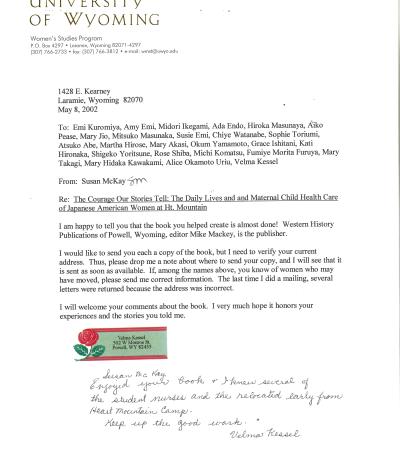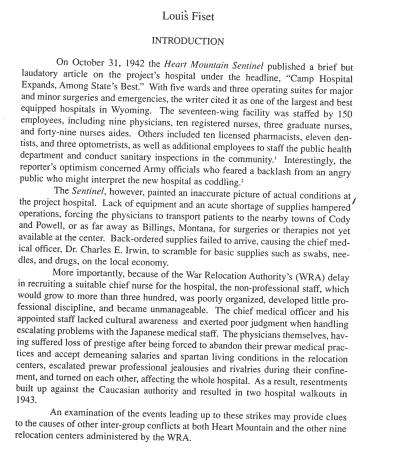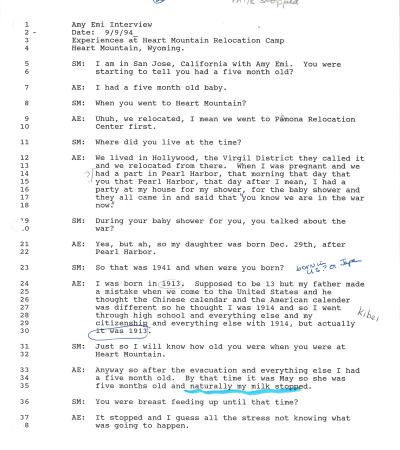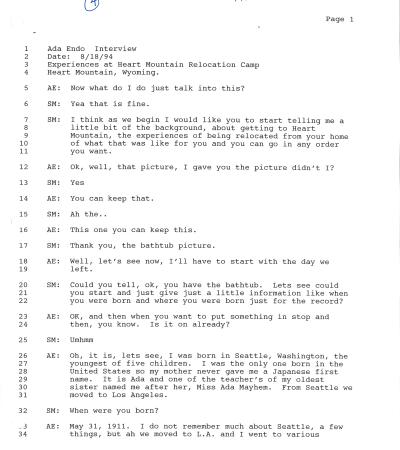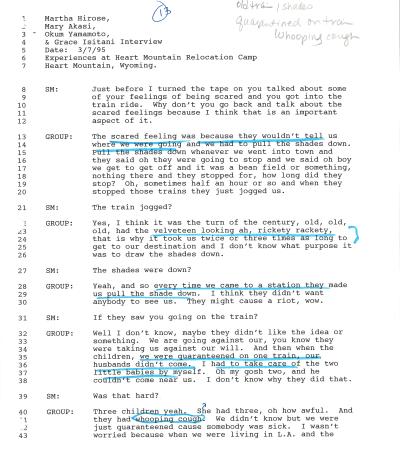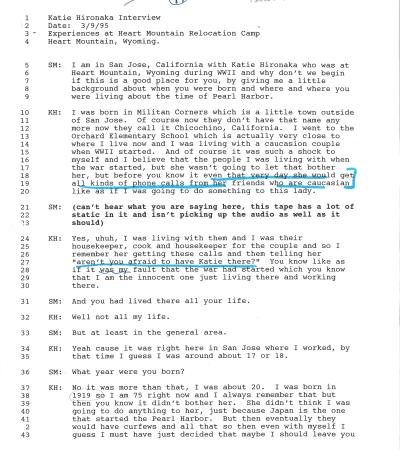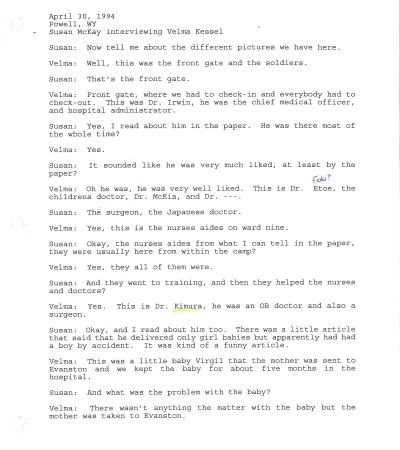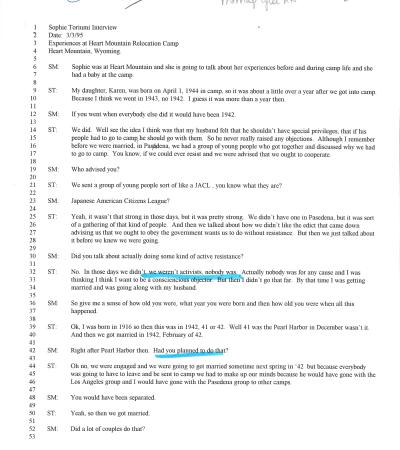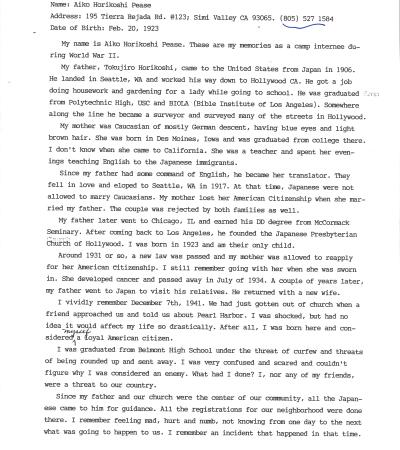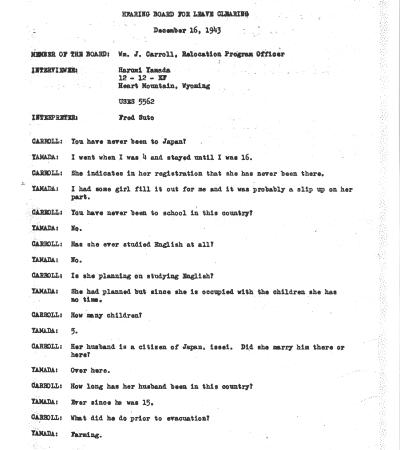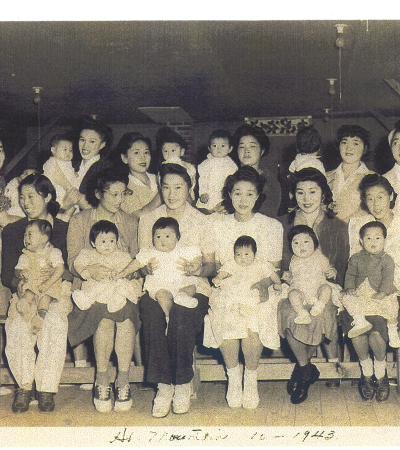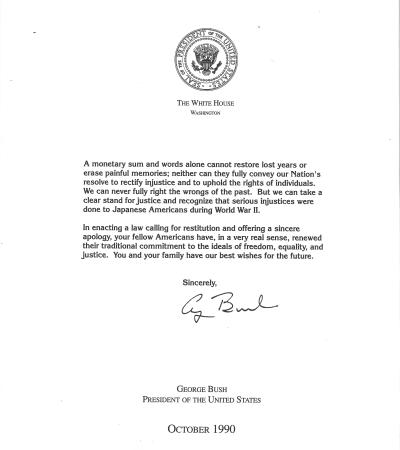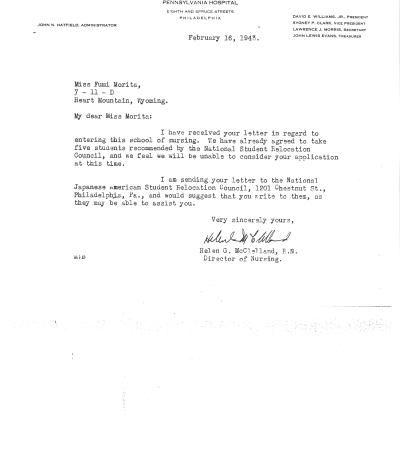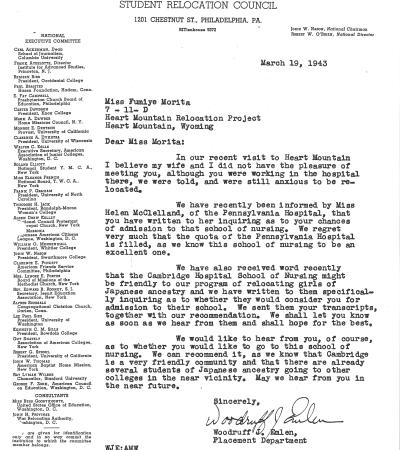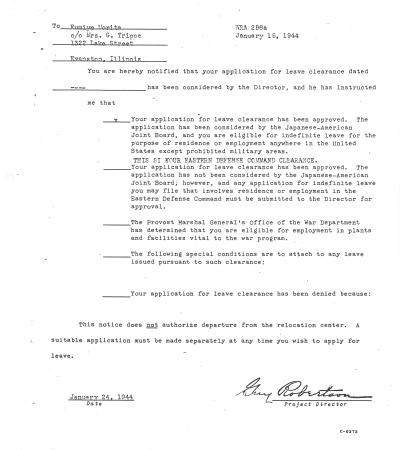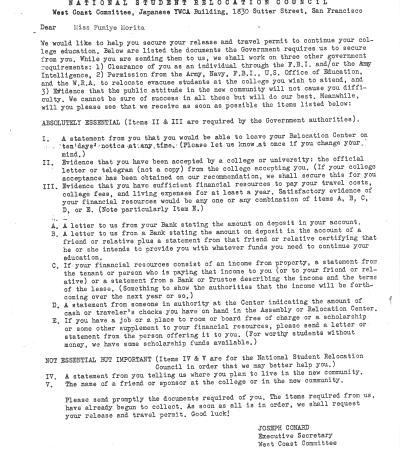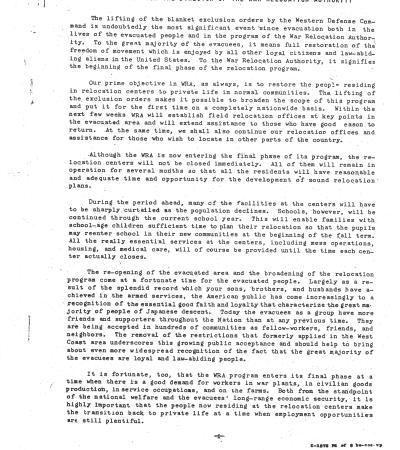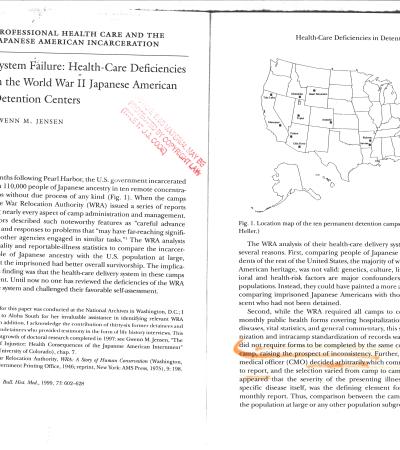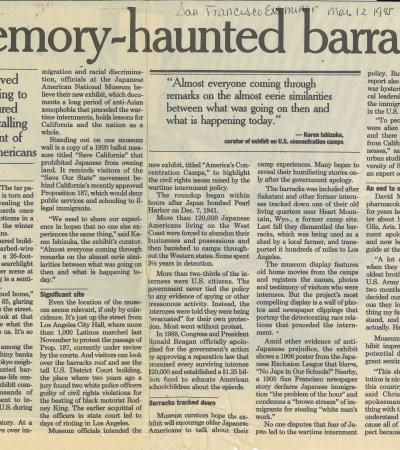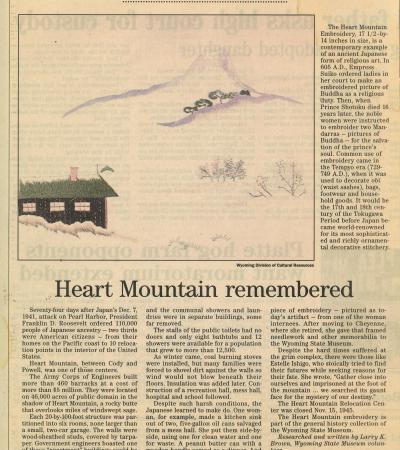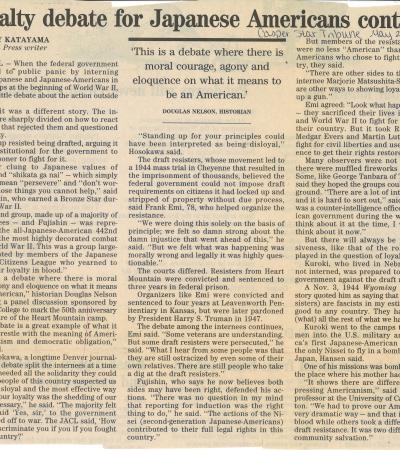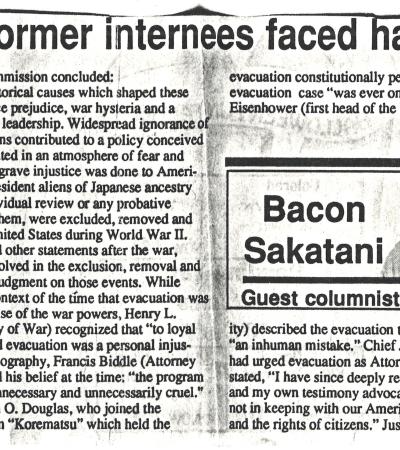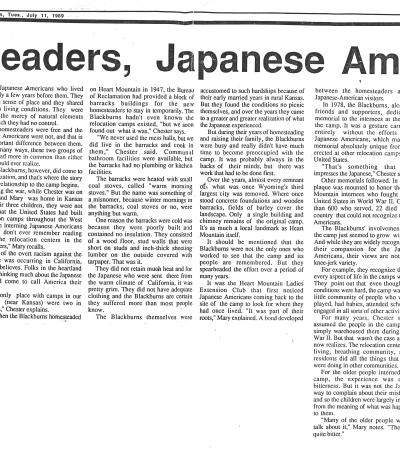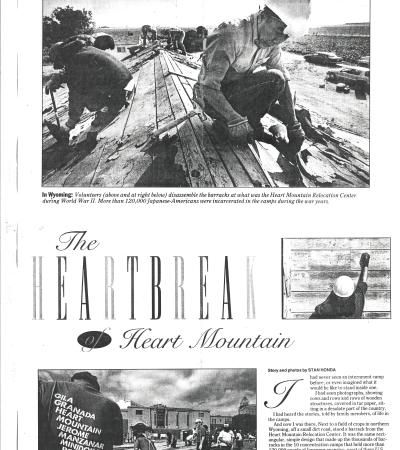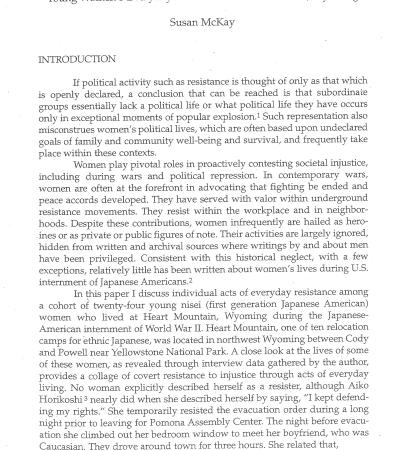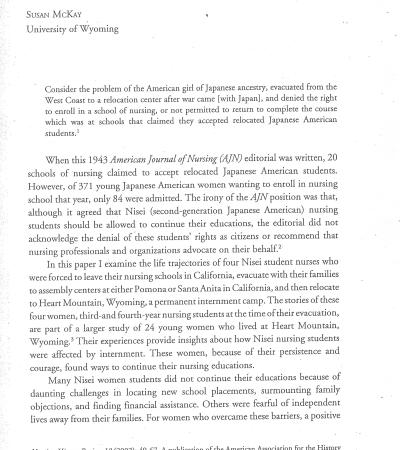Susan McKay is an emeritus professor in the University of Wyoming’s Gender and Women’s Studies program. She retired from UW in 2011. For more than two decades, she taught and researched issues focused on women, girls, and armed conflict. Her papers contain research materials related to her book The Courage Our Stories Tell: The Daily Lives and Maternal Child Health Care of Japanese American Women at Heart Mountain published in 2002. Those materials include interviews with women incarcerated at Heart Mountain.
To review this collection's contents, see the "Inventory for collection."
Letter from Susan McKay, May 8, 2002
Susan McKay interviewed more than 20 women who had either been incarcerated at Heart Mountain or had worked there as nurses. She used the interview materials as the basis for her book titled The Courage Our Stories Tell.
"The Heart Mountain Hospital Strike of June 24, 1943"
This excerpt of the book Remembering Heart Mountain: Essays on Japanese American Internment in Wyoming, provides insight into the conditions experienced by the Japanese medical staff at the Heart Mountain hospital.
Amy Emi Interview Transcript, September 9, 1994
Susan McKay's interview with Amy Emi covers Emi's experiences at Heart Mountain, including Emi's husband's arrest and imprisonment for his role in the Heart Mountain Fair Play Committee, which coordinated Nisei resistance to the military draft.
Ada Endo Interview Transcript, August 18, 1994
Susan McKay's interview with Ada Endo covers Endo's experiences at Heart Mountain, including the anger Endo felt at being treated like an enemy in her own country.
Group Interview Transcript with Martha Hirose, Mary Akasi, Okum Yamamoto and Grace Isitani, March 7, 1995
Susan McKay's interview covers the experiences of 4 young mothers incarcerated at Heart Mountain.
Katie Hironaka Interview Transcript, March 9, 1995
Susan McKay's interview with Katie Hironaka covers Hironaka's experiences at Heart Mountain. Hironaka's husband was serving in the U.S. Army while she was incarcerated.
Velma Kessel Interview Transcript, April 30, 1994
Susan McKay's interview with Velma Kessel covers Kessel's experiences at Heart Mountain. Kessel was Caucasian and worked as a nurse at the Heart Mountain Hospital for nearly 3 years.
Sophie Toriumi Interview Transcript, March 3, 1995
Susan McKay's interview with Sophie Toriumi covers Toriumi's experiences at Heart Mountain. Toriumi's husband was a minister and her interview gives insight into religion at Heart Mountain.
Memories of Aiko Horikoshi Pease, January 28, 1993
Horikoshi's manuscript includes her memories of being sent first to the Pomona California Assembly Center and then on to Heart Mountain Relocation Center. At Heart Mountain she worked in the hospital and also worked briefly as a domestic helper in Powell. Her father was a minister who held services at Heart Mountain.
Transcript from the Hearing Board for Leave Clearing for Harumi Yamada, December 16, 1943
Heart Mountain incarceree Harumi Yamada, like all those at Heart Mountain seeking permission to leave, had to attend a hearing. This transcript gives insight into the kinds of questions asked by the War Relocation Authority Hearing Board's Relocation Program Officer.
Photo of young mothers at Heart Mountain, October 1943
This photo is representative of the many young mothers incarcerated with their babies at Heart Mountain Relocation Center.
Proclamation by President George H.W. Bush, October 1990
In 1988, Congress passed the Civil Liberties Act of 1988 that acknowledged the injustice of the internment of people of Japanese descent during World War II, apologized for it, and provided a $20,000 cash payment to each person still living who was incarcerated.
Rejection Letters to Fumiye Morita, February 1943
Incarcerated students like Fumiye Morita, seeking to enroll to continue their nursing education, faced obstacles in gaining admission. There were quotas for Japanese American students, fears that the students would face hostilities from patients, and outright refusal to enroll students of Japanese ancestry.
Letter from the National Japanese American Student Relocation Council to Fumiye Morita, March 19, 1943
The National Japanese American Student Relocation Council was established to help students of Japanese ancestry overcome the hurdles that they faced in enrolling in colleges across the U.S.
War Relocation Authority Notice of Action on Application for Leave Clearance, January 15, 1944
In order to enroll in college, incarcerated students like Fumiye Morita had to get permission from the War Relocation Authority.
Letter from National Student Relocation Council to Fumiye Morita
Incarcerated students like Fumiye Morta faced further obstacles as they tried to enroll in colleges and universities. In addition to meeting the academic requirements for admission, they had to prove they had sufficient financial resources to pay for a years' worth of travel costs, college fees and living expenses.
A Message from the Director of the War Relocation Authority
This document outlines new policies and support systems for those in internment centers after the lifting of exclusion orders. It details how housing, education, and medical care will be handled during the transition as people begin leaving. While the stated goal was reintegrating internees into their communities on the West Coast or of resettling them elsewhere, the realities of life for many people leaving Heart Mountain was much harsher.
"System Failure: Health-Care Deficiencies in the World War II Japanese American Detention Centers" by Gwenn N. Jensen, 1999
This paper investigates the severe shortcomings of the healthcare provided in the Japanese American internment camps during World War II. It critiques the War Relocation Authority’s (WRA) favorable self-assessment, highlighting that the camps were plagued by inadequate planning, insufficient medical supplies, overcrowding, and environmental hazards, all exacerbated by racial discrimination. These issues led to preventable illnesses and fatalities.
"Memory-haunted barracks", San Francisco Examiner, March 12, 1995
This article discusses the relocation of a barracks from Heart Mountain to the Japanese American National Museum in Los Angeles, and the parallels between anti-Asian xenophobia during World War II and anti-immigrant sentiments in 1995.
"Heart Mountain remembered", Casper Star-Tribune, March 31, 1996
This article discusses the harsh conditions at Heart Mountain and highlights a piece of embroidery created by an incarceree.
"Loyalty debate for Japanese Americans continues", Casper Star-Tribune, May 22, 1995
This article covers the debate between formerly incarcerated Japanese Americans. Some believed that resisting the draft during World War II was legitimate resistance to being deprived of constitutional rights, others felt that it was patriotic to answer the call to serve in the military as a sign of loyalty to the U.S.
"When the camps closed, former internees faced hardship and deprivation" by Bacon Sakatani
This article discusses the aftermath of the Japanese American internment and quotes government officials who recognized after the fact that "to loyal citizens this forced evacuation was a personal injustice" and an "inhuman mistake."
"Homesteaders, Japanese Americans", Powell Tribune, July 11, 1989
This article relates the experiences of Chester and Mary Blackburn who homesteaded on the land that had previously been used to house Heart Mountain Relocation Center. They dedicated a memorial to the internees at the site of the camp, before the Heart Mountain Interpretive Center was opened.
"The Heartbreak of Heart Mountain", San Diego Union-Tribune, November 10, 1994
This article documents the project to move a barrack from Heart Mountain to Los Angeles for an exhibit, with the purpose of telling the history of the camps, "so that the forced internment will not be forgotten, and so this will never happen again."
"Young Women's Everyday Resistance: Heart Mountain, Wyoming" by Susan McKay
This paper discusses the understated and everyday resistance of young Japanese-American women interned at Heart Mountain during World War II. These women engaged in subtle acts that challenged patriarchal and governmental authority, asserting personal dignity and community welfare amid adversity. Their resistance served as quiet yet impactful forms of opposition against the injustices of internment.
"'The Problem' of Student Nurses of Japanese Ancestry During World War II" by Susan McKay, 2002
This paper explores the experiences of four Japanese American student nurses who were forced to relocate to internment camps, including Heart Mountain, during World War II. Despite the difficulties they faced in relocating, accessing education, and dealing with racial discrimination, these women persevered, finding work as nurses in internment camp hospitals and eventually continuing their nursing education outside the camps.
